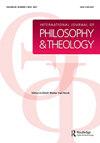Faith, power, and philosophy: divine-human interaction reclaimed
IF 0.3
0 PHILOSOPHY
International Journal of Philosophy and Theology
Pub Date : 2022-08-08
DOI:10.1080/21692327.2022.2140185
引用次数: 0
Abstract
ABSTRACT Many philosophers and theologians try to add credibility to Christian faith by means of philosophical arguments and explanations. There are two main ways to pursue this aim, and one way is arguably more defensible than the other, at least from the perspective of the apostle Paul. Philosophers and theologians who hold that Paul has a contribution to make in this area should consider the relative efficacy of these two ways. The key area of contrast lies in the epistemic basis of relevant philosophical arguments and explanations: either a basis in the power of direct divine self-manifestation or a basis just in philosophical claims. The latter basis will neglect or obscure the power distinctive of the Christian God and thus miss out on foundational evidence characteristic of that God. This article clarifies what that power is, in terms of responsive divine self-manifestation as God’s self-witness to divine reality and goodness in receptive human moral experience and character formation. The article explains how such power, being interactive toward divine righteousness, serves as a significant alternative to such prominent philosophical overlays on Christian faith as Platonism, Thomism, and Kantianism. The latter overlays improperly depersonalize key evidence for God’s reality and goodness.信仰、权力和哲学:神圣的人类互动
摘要许多哲学家和神学家试图通过哲学论证和解释来增加基督教信仰的可信度。追求这一目标有两种主要方式,至少从使徒保罗的角度来看,一种方式可以说比另一种方式更有说服力。认为保罗在这方面有贡献的哲学家和神学家应该考虑这两种方式的相对效力。对比的关键领域在于相关哲学论点和解释的认识基础:要么是直接神圣自我表现的力量的基础,要么是哲学主张的基础。后一种基础将忽视或模糊基督教上帝的独特力量,从而错过了该上帝的基本证据。这篇文章阐明了这种力量是什么,在接受人类道德体验和性格形成的过程中,作为上帝对神圣现实和善良的自我见证的回应性神圣自我表现。这篇文章解释了这种权力是如何与神圣的正义互动的,它是如何成为柏拉图主义、托米斯主义和康德主义等突出的基督教信仰哲学叠加的重要替代品。后者不恰当地覆盖了上帝真实和善良的关键证据。
本文章由计算机程序翻译,如有差异,请以英文原文为准。
求助全文
约1分钟内获得全文
求助全文
来源期刊

International Journal of Philosophy and Theology
PHILOSOPHY-
CiteScore
0.30
自引率
0.00%
发文量
12
期刊介绍:
International Journal of Philosophy and Theology publishes scholarly articles and reviews that concern the intersection between philosophy and theology. It aims to stimulate the creative discussion between various traditions, for example the analytical and the continental traditions. Articles should exhibit high-level scholarship but should be readable for those coming from other philosophical traditions. Fields of interest are: philosophy, especially philosophy of religion, metaphysics, and philosophical ethics, and systematic theology, for example fundamental theology, dogmatic and moral theology. Contributions focusing on the history of these disciplines are also welcome, especially when they are relevant to contemporary discussions.
 求助内容:
求助内容: 应助结果提醒方式:
应助结果提醒方式:


